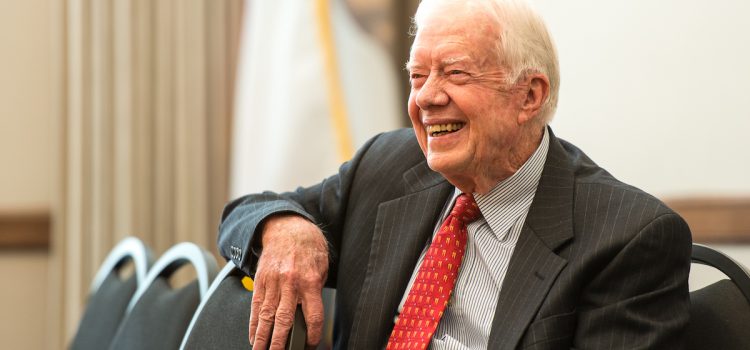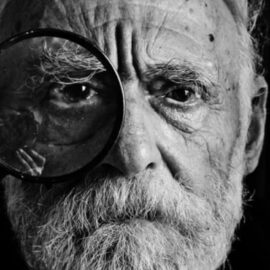

This article is an excerpt from the Shortform book guide to "His Very Best" by Jonathan Alter. Shortform has the world's best summaries and analyses of books you should be reading.
Like this article? Sign up for a free trial here.
Do you think of Jimmy Carter more as a president or as a humanitarian? What does he believe is the first step to improving human rights? Why was the Carter Center downgraded from its status as a charity recipient?
Jimmy Carter isn’t remembered as a great president, but he’s come to be revered for his work as a humanitarian. Biographer Jonathan Alter writes about this man who, for decades, refused to let his advancing years slow him down.
Keep reading to learn about Jimmy Carter’s humanitarian work that has made him a beloved figure all over the world.
Jimmy Carter’s Humanitarian Work
Jimmy Carter’s humanitarian work around the world is his way of leveraging his status as a former head of state. Unlike other ex-presidents, Carter didn’t retire from public life or cash in on his fame. Alter writes that Carter’s most strident efforts were in brokering peace with dictatorial regimes and promoting public health reform in developing nations. However, Alter says that, despite the public perception of Carter’s work in later years, his time in the White House was far more impactful than any of his actions as a former president.
(Shortform note: The idea that Carter’s presidency is generally underrated is shared by several other biographers. In The Outlier, award-winning author Kai Bird argues that Carter was the hardest-working president of modern times and that he achieved more in office than some presidents who followed. In The Unfinished Presidency, historian Douglas Brinkly argues that Carter’s accomplishments in later years wouldn’t have been possible without the diplomatic groundwork he’d begun while in the White House. In President Carter, American diplomat Stuart E. Eizenstat gives an inside view of the Carter administration that is critical of the former president’s flaws while emphasizing Carter’s unsung achievements.)
In 1982, Carter built upon his presidential library to develop the Carter Center in Atlanta, Georgia—a diplomatic meeting ground for leaders from around the world. Meanwhile, Carter has often reached out to world leaders in regions marred by conflict—in Africa, the Middle East, and even North Korea—going so far as to meet with dictators guilty of serious human rights abuses. Alter argues that, for Carter, bringing an end to violence is a necessary first step to improving human rights around the world.
(Shortform note: The Carter Center continues to partner with political advocacy groups and foreign governments to host discussions on voting rights, fair elections, and engaging people in the democratic process. As a nonprofit, the Carter Center ranks very high in transparency, efficiency, and making impactful use of its resources. Nevertheless, the independent monitoring group Charity Watch downgraded the Carter Center as a charitable recipient, not due to any ethical or financial failure, but because, as of 2022, the Carter Center is so flush with funds that it could continue to operate for 10 more years without receiving any additional donations.)
The Carter Center also channels philanthropic funds to support countries struggling with public health problems. In Africa, the Carter Center’s initiatives have been particularly successful in negotiating with governments and pharmaceutical companies to halt the spread of debilitating diseases. Alter says that, thanks to the Carter Center’s efforts, Guinea worm disease has been almost completely eradicated. Because of Carter’s humanitarian outreach, he’s well-loved in many countries that are otherwise anti-US.
(Shortform note: Part of the reason for Carter’s popularity overseas may be due to his personal engagement with people in struggling communities. While Alter touches on this subject, those who’ve worked with Carter describe in detail the ways in which Carter personally reached out to people with illnesses in impoverished nations, acting as an on-the-ground advocate more than as a remote administrator. In modern Africa, Carter is thought of as someone who’s shown far more concern for their continent than other Western leaders.)
Alter concludes by observing that Carter’s long and active ex-presidency has shifted the public perception of him since the days when he was voted out of office. In his later years, Carter’s life has been reexamined, not in terms of his failings as a president and politician, but for embodying his fundamental values of integrity, hard work, and compassion.
| Jimmy Carter’s Legacy Jimmy Carter’s long, productive life has been celebrated by the many accolades he’s received. In addition to winning the Nobel Peace Prize in 2002, he was given the UN Human Rights Award in 1998, the O’Connor Justice Prize in 2017, and the Gerald R. Ford Medal for Distinguished Public Service. Carter’s memoir An Hour Before Daylight was a finalist for the Pulitzer Prize, and he’s won three Grammy Awards for Best Spoken Word Album for the audio productions of his books Our Endangered Values, A Full Life, and Faith. On February 18, 2023, at the age of 98, Carter went into hospice care at his home in Plains, Georgia. While Carter’s health issues haven’t been disclosed, the purpose of hospice care is to make a person’s final days or months as comfortable as possible rather than fighting to prolong their life. It was later announced that Rosalynn Carter, at the age of 95, was suffering symptoms of dementia. Jimmy Carter’s failing health was met with an outpouring of tributes by politicians and public figures. In May 2023, the Carters’ grandson reported that Jimmy and Rosalynn were happy together and appreciative of all the support they’d received. |
Note: The banner image’s author is Commonwealth Club from San Francisco, San Jose, United States, CC BY 2.0. No changes were made to the image.

———End of Preview———
Like what you just read? Read the rest of the world's best book summary and analysis of Jonathan Alter's "His Very Best" at Shortform.
Here's what you'll find in our full His Very Best summary:
- A fresh perspective on Jimmy Carter's time as president
- How Carter's early life shaped his political career
- The long-term effects of what Carter accomplished while president






